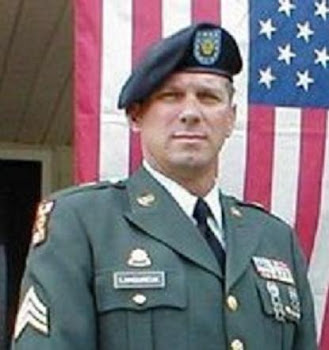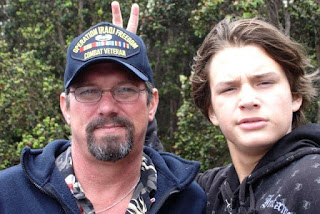By Peter Hirschfeld
VERMONT PRESS BUREAU
Published: November 11, 2009
For troubled veterans whose criminal offenses can be linked to the psychological scars of military deployments, a new Vermont court could replace probation and prison terms with counseling and therapy.
As Vermont prepares for the largest deployment of National Guard soldiers since World War II, mental health professionals and justice officials say they anticipate a surge in the number of veterans entering the state's criminal justice system.
Proponents of the fledgling court say the program, funded in part by a $2.1 million federal grant, will offer a more compassionate, and ultimately more effective, method of dealing with veterans suffering from service-connected mental health conditions.
"It really shows that despite our small size, Vermont many times is on the cutting edge of providing services to veterans," said Clayton Clark, head of the Vermont Office of Veterans Affairs. "We think it's a great way to ensure that veterans having troubles get cared for in the best way possible."
The Jail Diversion, Trauma Recovery program will operate under the auspices of a mental health court already in existence in Chittenden County. The $2.1 million grant, from the Substance Abuse and Mental Health Services Administration, will expand staff there and place a special focus on veterans, though any Vermonter with a mental health condition will be potentially eligible for the specialized court.
Offenders could avoid traditional criminal sanctions by agreeing to participate in court-ordered treatment plans.
(click here for complete story)
http://www.timesargus.com/article/20091111/NEWS01/911110333/1002/NEWS01
Sue Lamoureux's blog for her husband, J Patrick Lamoureux. Sue died on 24 August 2015.
PAT LAMOUREUX

PAT LAMOUREUX - One episode in a person's life, does not define the person.
Saturday, November 21, 2009
Jail Diversion Programs for Veterans Funded
(source: The National Center for Addiction and Substance Abuse, Columbia University)
October 11, 2009
Programs that work to keep veterans suffering from post-traumatic stress and related disorders out of prison have been awarded a total of $10 million in grants by the Substance Abuse and Mental Health Services Administration (SAMHSA).
The six SAMHSA grants went to states to expand jail diversion programs on a statewide and local level. Each recipient will launch a pilot program and then expand it to other communities. Grants equal up to $394,000 annually over five years.
Recipients of the awards, administered by SAMHSA's Center for Mental Health Services, including Florida, New Mexico, North Carolina, Ohio and Rhode Island. Programs will provide addiction and/or mental health services in lieu of incarceration.
October 11, 2009
Programs that work to keep veterans suffering from post-traumatic stress and related disorders out of prison have been awarded a total of $10 million in grants by the Substance Abuse and Mental Health Services Administration (SAMHSA).
The six SAMHSA grants went to states to expand jail diversion programs on a statewide and local level. Each recipient will launch a pilot program and then expand it to other communities. Grants equal up to $394,000 annually over five years.
Recipients of the awards, administered by SAMHSA's Center for Mental Health Services, including Florida, New Mexico, North Carolina, Ohio and Rhode Island. Programs will provide addiction and/or mental health services in lieu of incarceration.
Friday, November 20, 2009
Military experiment seeks to predict PTSD
washingtonpost.com
By ALICIA CHANG
The Associated Press
Friday, November 20, 2009; 1:01 AM
TWENTYNINE PALMS, Calif. -- Two days before shipping off to war, Marine Pfc. Jesse Sheets sat inside a trailer in the Mojave Desert, his gaze fixed on a computer that flashed a rhythmic pulse of contrasting images.
Smiling kids embracing a soldier. A dog sniffing blood oozing from a corpse. Movie star Cameron Diaz posing sideways in a midriff top. Troops cowering for safety during an ambush.
A doctor tracked his stress levels and counted the number of times he blinked. Electrode wires dangled from his left eye and right pinky finger.
Sheets is part of a military experiment to try to predict who's most at risk for post-traumatic stress disorder. Understanding underlying triggers might help reduce the burden of those who return psychologically wounded - if they can get early help.
(click here for complete article)
http://www.washingtonpost.com/wp-dyn/content/article/2009/11/20/AR2009112000003.html
By ALICIA CHANG
The Associated Press
Friday, November 20, 2009; 1:01 AM
TWENTYNINE PALMS, Calif. -- Two days before shipping off to war, Marine Pfc. Jesse Sheets sat inside a trailer in the Mojave Desert, his gaze fixed on a computer that flashed a rhythmic pulse of contrasting images.
Smiling kids embracing a soldier. A dog sniffing blood oozing from a corpse. Movie star Cameron Diaz posing sideways in a midriff top. Troops cowering for safety during an ambush.
A doctor tracked his stress levels and counted the number of times he blinked. Electrode wires dangled from his left eye and right pinky finger.
Sheets is part of a military experiment to try to predict who's most at risk for post-traumatic stress disorder. Understanding underlying triggers might help reduce the burden of those who return psychologically wounded - if they can get early help.
(click here for complete article)
http://www.washingtonpost.com/wp-dyn/content/article/2009/11/20/AR2009112000003.html
Wednesday, November 18, 2009
Policing Vets
SPECIAL REPORT
Policing Vets
By Julia Dahl
Crime Report
Monday, November 16th, 2009 10:33 am
"Farr explains that after reading about an incident near Las Vegas during which police responded to a troubled vet in what he considered to be an over-aggressive manner, he concluded that with the proper instruction they might have been able to talk the vet down. He decided to use his college training as a filmmaker to create a video that would give police an “awareness and sensitivity” to the psychological issues faced by returning veterans."
"The problem of veterans who struggle with the psychological scars of war is not new. Tom Schumacher, the PTSD Director at the Department of Veterans Affairs in Washington State, helped police counsel troubled Vietnam veterans in the 1980s, and says that although law enforcement had relationships with VA counselors back then, there was never any formal training provided to officers.
Farr wanted to change this. He sought permission and support from his bosses at the VA for the video, and in late 2008 received $5,000 from his outreach budget. He consulted with Utah’s CIT program director, hired some friends to help him, and in March 2009 began presenting the 18-minute video entitled “Walking Wounded,” to law enforcement leadership in Utah.
The response was overwhelmingly positive, and Farr says the video is now being used by law enforcement in at least 28 states and by three federal agencies.
In the third and final part of our Veterans Day investigation of how the U.S. justice system interacts with veterans, we look at innovative programs designed to help police understand the traumas afflicting soldiers in the transition to civilian life.
(click here for complete story)
http://thecrimereport.org/2009/11/16/policing-vets
Policing Vets
By Julia Dahl
Crime Report
Monday, November 16th, 2009 10:33 am
"Farr explains that after reading about an incident near Las Vegas during which police responded to a troubled vet in what he considered to be an over-aggressive manner, he concluded that with the proper instruction they might have been able to talk the vet down. He decided to use his college training as a filmmaker to create a video that would give police an “awareness and sensitivity” to the psychological issues faced by returning veterans."
"The problem of veterans who struggle with the psychological scars of war is not new. Tom Schumacher, the PTSD Director at the Department of Veterans Affairs in Washington State, helped police counsel troubled Vietnam veterans in the 1980s, and says that although law enforcement had relationships with VA counselors back then, there was never any formal training provided to officers.
Farr wanted to change this. He sought permission and support from his bosses at the VA for the video, and in late 2008 received $5,000 from his outreach budget. He consulted with Utah’s CIT program director, hired some friends to help him, and in March 2009 began presenting the 18-minute video entitled “Walking Wounded,” to law enforcement leadership in Utah.
The response was overwhelmingly positive, and Farr says the video is now being used by law enforcement in at least 28 states and by three federal agencies.
In the third and final part of our Veterans Day investigation of how the U.S. justice system interacts with veterans, we look at innovative programs designed to help police understand the traumas afflicting soldiers in the transition to civilian life.
(click here for complete story)
http://thecrimereport.org/2009/11/16/policing-vets
Subscribe to:
Comments (Atom)
"Grandpa Pat & Kain"

"Kain-man" the jokester....
Pat Lamoureux - Iraq 2003

"Pat is an extraordinary, thoughtful, kind and generous man...not to mention a wonderful friend, in which one could always count upon to be there when in need." (words of a long time friend)
Pat's Family

Mica & Heather, grandson Kain